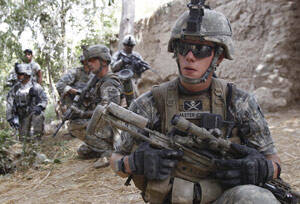When the United States had a military draft, conscientious objector status was sought mostly by people who opposed all wars. But in the decades since then, the country has turned to an all-volunteer military; and the issue of conscientious objection now usually arises with people who volunteered for military service but came to have moral qualms about a specific conflict. A new report from the Truth Commission on Conscience in War documents the moral and psychological harm inflicted by the nation’s current C.O. policy and calls for revising U.S. military regulations to allow such “selective conscientious objection.”
Logan Mehl-Laituri and Camilo Mejia are Army veterans who support the concept of selective C.O. status. Mehl-Laituri spent more than six years in the Army, including a 14-month combat stint in Iraq as an artillery forward observer, responsible for directing weapons fire to targets. Mejia spent nearly nine years in the Army and the Florida National Guard, reaching the rank of staff sergeant and deploying to Iraq as an infantry squad leader in 2003.
During their deployments to Iraq, both men came to have serious doubts about the morality of the war and wanted out. Mehl-Laituri succeeded in receiving an honorable discharge. And during a two-week home leave, six months into his Iraq tour, Mejia decided not to return to his base. After five months in hiding, he held a news conference to explain his position and turned himself in to military authorities. He was court-martialed, convicted of desertion and served nine months in prison. Both Mejia and Mehl-Laituri unsuccessfully sought conscientious objector status.
Both men said that their efforts to understand the moral issues raised by their involvement in war led them to study church teachings about just war. Mehl-Laituri said he has come to believe that some of the post-traumatic stress disorder experienced by returned troops stems from the kind of moral conflict that led him to decide he could not return to Iraq in a combat role.
Referring to that moral struggle, Mehl-Laituri said, “The long-term impact can be devastating at the emotional, communal and moral levels.... Self-condemnation can be so severe it can lead to suicide.”
Mejia’s duties in Iraq at a detention center also included using psychological tactics he considers to be torture.
The U.S. Conference of Catholic Bishops has long supported selective conscientious objection, citing the concept in documents like their 1983 pastoral letter, “The Challenge of Peace,” and its follow-up in 1993, “The Harvest of Justice Is Sown in Peace.”








